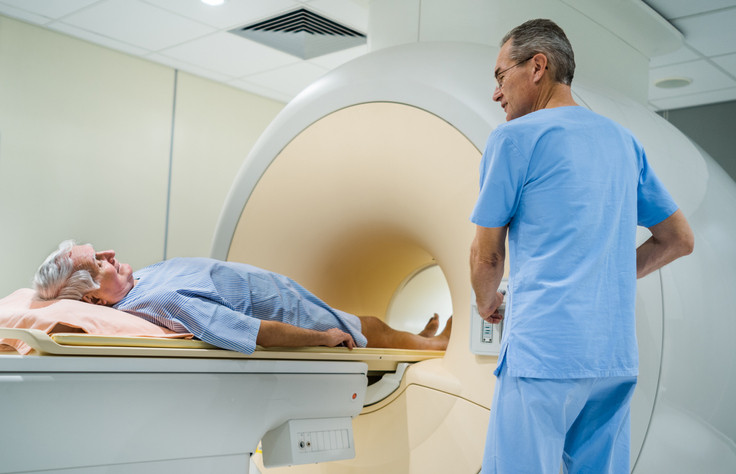
Trying to lose weight? Be careful not to lose muscle

Is your skin problem actually an autoimmune condition?

People with diabetes face higher risk of hearing loss

Antibiotic-free fixes for recurrent UTIs

Musculoskeletal syndrome of menopause: When menopause makes you ache all over

When can older women stop getting mammograms?

To lose weight, especially harmful belly fat, combine diet and exercise

Can men hold off on treating recurring prostate cancer?

The 7 types of rest and why we need them all

What are the early warning signs of cervical cancer?
Prostate Cancer Archive
Articles
Radiation after prostate cancer surgery may not be necessary
In the journals
Many men with prostate cancer who have a radical prostatectomy (prostate removal) receive radiation therapy afterward to wipe out any residual cancer cells. Alternatively, men can choose to delay radiotherapy and be monitored for evidence of prostate cancer activity, such as a rising blood level of prostate-specific antigen (PSA). If PSA testing or an imaging test like an MRI shows cancer, these men can then consider radiation therapy.
According to the findings of an analysis published online Sept. 28, 2020, by The Lancet, there is no clear benefit of immediate radiation over monitoring with later radiation therapy as necessary. Since some men will never need radiotherapy, this means that by forgoing immediate treatment, they can avoid potential side effects like incontinence and bowel problems.
Hormone therapy and radiation may help with certain prostate cancer
In the journals
Men with intermediate-risk prostate cancer may benefit from undergoing androgen-deprivation therapy (ADT) depending on how far the cancer has progressed, says a study published online Sept. 9, 2020, by JAMA Network Open. The results could help men better weigh risk versus reward when choosing their prostate cancer treatment options.
The study looked at men with intermediate-risk prostate cancer. This is the mid-range of prostate cancer in terms of aggressiveness between low-risk (which often doesn't need treatment) and high-risk cancer. There are two categories of intermediate-risk cancer: favorable intermediate-risk (FIR) and the more advanced unfavorable intermediate-risk (UIR).
Combining two types of biopsies helps diagnose prostate cancer
In the journals
Combining two kinds of biopsies may lead to a more accurate diagnosis of prostate cancer, suggests a study in the March 5, 2020, issue of The New England Journal of Medicine. Researchers from the National Cancer Institute enrolled 2,103 men with prostate abnormalities. Each man had a standard 12-point biopsy and an MRI-targeted biopsy.
With a 12-point biopsy, tissue samples are taken from 12 systematically placed spots on the prostate. An MRI-targeted biopsy uses an MRI image of the prostate to help doctors locate areas where cancer is most highly suspected. Previous research has shown that MRI-targeted biopsies are more accurate than 12-point biopsies. However, even MRIs can miss some tumors.
The facts about testosterone and sex
Can boosting testosterone levels improve your sex life?
The hormone testosterone plays a big part in men's health, but perhaps its most meaningful role is to fuel sex drive and performance.
Testosterone levels tend to decrease with age. They peak by early adulthood and then can drop by up to 1% per year beginning around age 40. Sometimes an abrupt fall occurs because of an injury or illness (such as an infection), chemotherapy or radiation treatment, or certain medications.
Can vitamin and mineral supplements protect against prostate cancer?
On call
Q. Can specific types of supplements help reduce my risk of developing prostate cancer?
A. Most studies of vitamin and mineral supplements have had disappointing results. In fact, some even appear to increase prostate cancer risk. Here's a rundown on where everything stands.
Exercise can reduce the side effects of prostate cancer treatments
In the journals
Men who choose androgen deprivation therapy (ADT) for their advanced prostate cancer can avoid possible side effects with short-term exercise, suggests a study published in January 2020 in BJU International.
Common side effects of ADT include weight gain, loss of muscle mass, lower cardio fitness, fatigue, and a drop in quality of life. These often occur within three months after treatment begins. In the study, researchers recruited 50 men with prostate cancer who began ADT. Half did two supervised exercise sessions per week for three months. The hourlong workouts included both aerobic and resistance exercises. The group then continued the workouts on their own for another three months.
The option of prostate cancer surgery
Is surgery the best choice to treat your prostate cancer? Here's what you need to know.
There are many ways to deal with a prostate cancer diagnosis. You might choose the wait-and-see approach of active surveillance for low-risk disease, in which you monitor your condition and only treat if the cancer becomes more aggressive. In terms of treatments, you can opt for radiation therapy, which attacks cancer cells, or androgen deprivation therapy, which tries to slow cancer growth by shutting down testosterone production.
The remaining option is radical prostatectomy: surgery to remove the entire prostate gland. While this is the most invasive approach, it's the right choice for some men.
10 diet & exercise tips for prostate health
"What can I eat to reduce my risk of developing prostate cancer?" This is one of the most common questions physicians hear from men concerned about prostate health. Undoubtedly, many hope that their doctor will rattle off a list of foods guaranteed to shield them from disease. Although some foods have been linked with reduced risk of prostate cancer, proof that they really work is lacking, at least for now.
Aim for a healthy eating pattern
Instead of focusing on specific foods, dietitians, physicians, and researchers tout an overall pattern of healthy eating — and healthy eating is easier than you might think. In a nutshell, here's what experts recommend:
Prostate cancer and your sex life
Undergoing treatment and managing the condition can lower libido and lead to erectile dysfunction.
Considerable emotional and mental processing comes with a prostate cancer diagnosis. "Prostate cancer strikes a personal part of a man's body, and for most, it is a glaring sign of aging and a reminder they are not as young as before," says Dr. Mark Pomerantz, an oncologist with Harvard-affiliated Dana-Farber Cancer Institute.
Then there is the stressful decision about treatment. Yet many men don't realize how much their choice may influence their sex life.
Mushrooms may protect against prostate cancer
In the journals
A study published online Sept. 4, 2019, by the International Journal of Cancer showed a possible connection between regular mushroom consumption and a lower risk of prostate cancer.
The researchers recruited more than 36,000 men ages 40 to 79. They recorded various health information, such as physical activity, family and medical history, and diet. Information on diet included 39 foods and beverages. The men were then followed for a period ranging from 13 to almost 25 years.

Trying to lose weight? Be careful not to lose muscle

Is your skin problem actually an autoimmune condition?

People with diabetes face higher risk of hearing loss

Antibiotic-free fixes for recurrent UTIs

Musculoskeletal syndrome of menopause: When menopause makes you ache all over

When can older women stop getting mammograms?

To lose weight, especially harmful belly fat, combine diet and exercise

Can men hold off on treating recurring prostate cancer?

The 7 types of rest and why we need them all

What are the early warning signs of cervical cancer?
Free Healthbeat Signup
Get the latest in health news delivered to your inbox!
Sign Up











